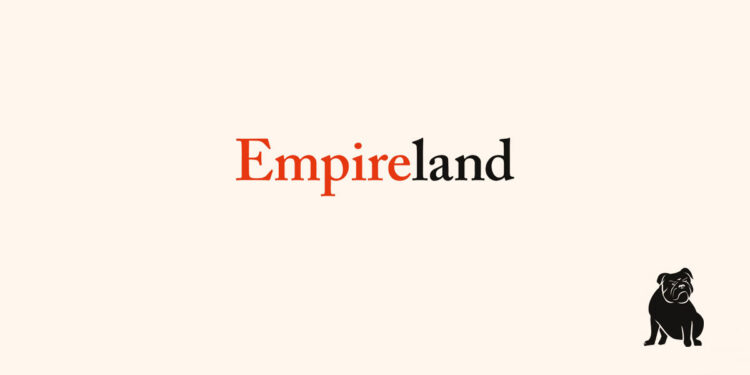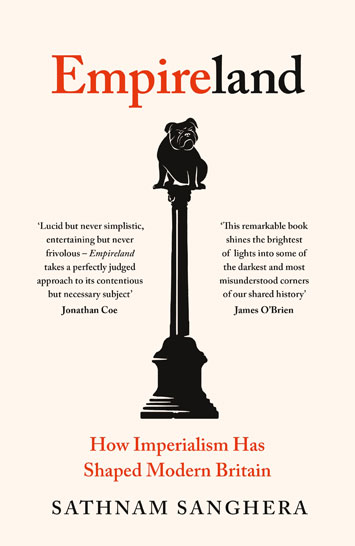Empireland by Sathnam Sanghera – Review

By Jeff Halden
This book’s sub-title is ‘How Imperialism Has Shaped Modern Britain’, and it’s Sanghera’s argument in this fascinating and timely book that Britain is a direct product of its imperial past.
Furthermore, he argues that it has never confronted this history – unlike Germany – and that there is a pressing need ‘for proper education about the reality of the Empire in order to address our attitudes to our past and its effect on the present’.
This is a deeply personal book, meticulously researched – its 216 pages of text supported by 67 of bibliography and notes – and passionately argued. Its author, Sathnam Sanghera was born to Punjabi immigrant parents in Wolverhampton in 1976 and after graduating from Christ College, Cambridge with a first class degree in English Language and Literature, has won numerous awards for his books and journalism.
It’s Sanghera’s thesis that the effect of the British Empire upon this country is still poorly understood; despite the toppling of statues, the renaming of buildings and the almost daily litany of corporate apologies for being involved in the historic slave trade. In order to improve this understanding, he begins the book by suggesting – somewhat tongue in cheek – that an Empire Day 2.0, an awareness day about the consequences of empire on this country would be beneficial.
 In case Empire Day 1.0 had passed you by, this half-day school holiday was established in 1916 to celebrate the splendour of Empire on Queen Victoria’s birthday, May 24th. Incredible as it now may seem, it actually lasted until 1958 only to be replaced by Commonwealth Day on the same date. Empire Day was an important occasion in those far-off days, when the atlas still showed large chunks of the world still reassuringly coloured red. Indeed, as a ten-year old wolf cub, your reviewer took part in the 1957 penultimate Empire Day parade in his home city of Kingston-upon-Hull.
In case Empire Day 1.0 had passed you by, this half-day school holiday was established in 1916 to celebrate the splendour of Empire on Queen Victoria’s birthday, May 24th. Incredible as it now may seem, it actually lasted until 1958 only to be replaced by Commonwealth Day on the same date. Empire Day was an important occasion in those far-off days, when the atlas still showed large chunks of the world still reassuringly coloured red. Indeed, as a ten-year old wolf cub, your reviewer took part in the 1957 penultimate Empire Day parade in his home city of Kingston-upon-Hull.
“Fascinating insights”
Sanghera sets out his convincing arguments in a series of chapters examining how various aspects of empire have left an indelible effect on every aspect of British life and culture. His personal experiences are interleaved with the products of his extensive research into the multiplicity of ways in which imperialism has shaped Britain.
The British Empire lasted for four or five centuries (depending from where you date its beginning) and, at its peak in 1920, covered roughly one quarter of the earth’s land area. It would not be surprising therefore if this colossal undertaking had not left its indelible mark.
Sanghera argues persuasively that successive Governments have not acknowledged centuries of slavery, exploitation, State racism, cultural connections and economic ties. He points out for instance that our largest museums are packed full of imperial booty, looted over the centuries, and seem extremely unwilling to return it to its original owners.
He also notes that the favourite asset through which to launder colonial booty was the country house; indeed the National Trust has identified that one third of its 300 houses and gardens were tainted by money from slavery or have treasures plundered from overseas.
Sanghera’s book is full of such fascinating insights, ranging as it does across politics, history, society and culture. Despite it clearly being the product of extensive academic research, the book is never dull, often humorous, and held my interest throughout.
The strength of this book, is that the author is able to make many of his arguments from a personal perspective. Whether or not you agree with that eminent historian of our colonial past, William Dalrymple, ‘that for much of our history, we were an aggressively racist and expansionist force responsible for violence, injustice and war crimes on every continent…’, Sathnam Sanghera has produced a nuanced, fair-minded and extremely readable account of our troubled relationship with empire which I can wholeheartedly recommend.
‘Empireland’ by Sathnam Sanghera is published by Viking, £18.99 hardback









